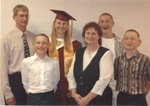Aside from being one of the most disconnected lectures that I have ever heard in my life, Scott Simon's lecture was long and did not hold my attention very well. I thought that some of what he had to say was good, but he did not present it in a way that I was able to follow. He started out with some humor, but he was unable to tie the humor into the main point of his speech, which I am not sure he even got to. He used a lot of stories that were interesting, but very unconnected and in some of them I had no idea who or what he was talking about - probably because I do not read or watch the news very often, but he did not do a good job of explaining who the people were or where he was talking about.
However, I was able to pull some things from his lecture that I think directly relate to teaching. He said, quoting someone else, that "sincerity is the key to [journalism], and if you can fake that, you'll go far." Now I don't think that faking sincerity is a good thing when talking about journalism or teaching. As a teacher you should be able to be sincere when talking to your students, and you should actually care about what you say to them and how you say it. He also said that journalists were as fallible as brain surgeons, and I think the same is true of teachers. We hold the lives of students in our hands and are responsible for what we teach them about the world and even what we unconsciously teach them about how to act, what to say, and what things are important. Students pick up on many things, just like a sharp audience, so we have to be careful and make sure that we act in a way that we would want replicated and make sure that we get the facts right. Simon also talked about how they used to think that the Earth was the center of the universe, and someone had said, it wasn't wrong, you just miss most of the rest of the universe. In our schools we are US-centered and we run the risk of missing most of the rest of the world. We need to make sure that students are informed about more than just US history or US politics or US religion. We are a global society and need to prepare students for this kind of world or they will be missing out. Finally, Simon talked about how you can begin to trust journalism when it has the audacity and integrity to give you facts that you don't really like. The same can be said of teachers. Teachers can be trusted when they trust their students with the truth of how the world is and what has happened in the past. It is not our job to paint a pretty picture of the history of our country or the world; it is our job to make sure that students understand what happened and why it happened and why we need to look at it now. So, overall it was an okay lecture and I got quite a bit out of it, but this also showed me how important it is to hook your audience from the beginning and be able to hold on to them throughout.
Subscribe to:
Post Comments (Atom)

No comments:
Post a Comment